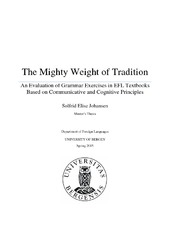The Mighty Weight of Tradition: An Evaluation of Grammar Exercises in EFL Textbooks Based on Communicative and Cognitive Principles
Master thesis
Permanent lenke
https://hdl.handle.net/1956/9960Utgivelsesdato
2015-05-14Metadata
Vis full innførselSamlinger
Sammendrag
The purpose of this master thesis is to evaluate grammar exercises in certain school textbooks with the intention of gaining insights into the quality of exercises based on principles derived from communicative and cognitive theories of language and language learning. My aim is to reveal aspects of our teaching materials which may be improved, and suggest changes. I chose to analyze textbooks for the Norwegian 10th grade, as this is the final mandatory school year in Norway. The books that have been analyzed, Crossroads10 B, New Flight 3, and Searching 10, are among the most widely used learning materials for the subject of English in Norwegian schools. The thesis is based on theories of learning and linguistic theories of language and language learning. The communicative perspective which lies as a theoretical foundation for the analysis emphasizes that language is a tool used for the purpose of communicating with other people, and that pedagogy used to support learning language consequently ought to reflect real communicative situations as far as possible. The research questions to be answered through this grammar exercise evaluation are: 1) What views of and approaches to grammar lies behind the design of grammar exercises in Norwegian textbooks? 2) To what extent do the exercises meet principles of communicative and cognitive learning theory? The analysis is based on a framework which consists of four categories: learning aims, grammatical objective, cognitive learning stage, as well as a set of pedagogical criteria and communicative criteria to assess the quality of language learning. The pedagogical and communicative criteria are analyzed according to a taxonomy of exercise types. The main trends in my findings are that the grammar exercises in textbooks seem to be quite strongly influenced by traditional' views of grammar and widely used exercise types. The result of this is that many of the grammar exercises essentially focus on testing the learner's declarative knowledge rather than facilitate learning of the grammatical objective. In addition, especially at lower stages of learning, the exercises tend to demand little mental activity from the learner and the learner's motivation to accomplish exercises does not seem to be taken account of. Other consequences of the traditional approaches to grammar are that the exercises involve principles of communicative language teaching such as context and interaction only to a small extent. Hence, the grammar exercises rarely reflect how grammar actually is used in real-life communication.
